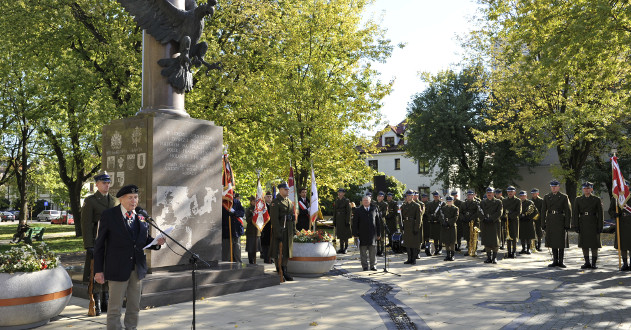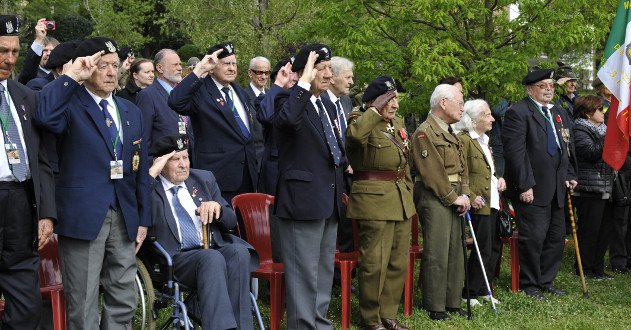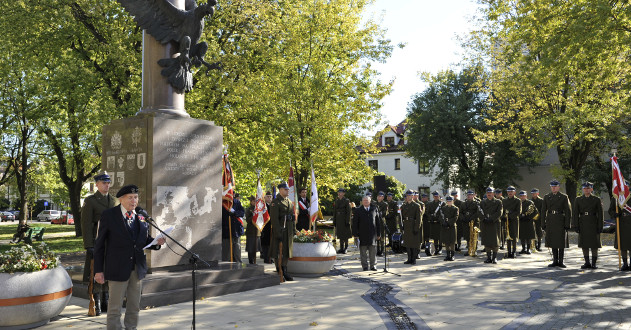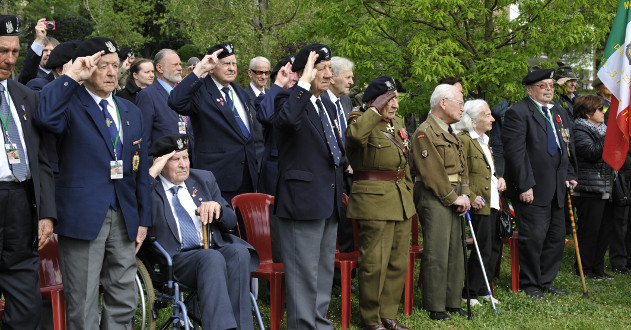News
Visit of the Head of the Office for War Veterans and Victims of Oppression in Australia and New Zealand
In November 2014, the Head of the Office for War Veterans and Victims of Oppression Jan Stanisław Ciechanowski took part in ceremonies marking the 70th anniversary of the arrival in New Zealand of the so-called Pahiatua Children and in a series of meetings with veterans of struggles for Polish independence and Siberian Deportees in New Zealand and Australia. This was the first visit of a representative of the Office for War Veterans and Victims of Oppression in those countries.
In November 1944, the New Zealand government gave shelter to 733 Polish children, for the most part orphans, and their 105 guardians – refugees from the USSR. The Pahiatua children found hospitality in New Zealand after a long trek. Firstly they had been deported deep into the USSR, then, together with the army of gen. Anders, they were evacuated to Persia (to today’s Iran). They arrived in New Zealand due to the efforts of Kazimierz Wodzicki, the Polish Consul-General in Wellington, and his wife Maria. The support of New Zealand Prime Minister Peter Fraser proved decisive. They were invited into this country towards the end of 1943 and reached Wellington on 1 November 1944 aboard the American ship USS General Randall.
To meet the needs of the Polish children and their guardians, a special camp was set up near the town of Pahiatua, some 172 km from Wellington. The campsite had initially been a horse race track which was completely redeveloped to ensure good conditions for the refugees that also served as a reminder of their homeland. Since the stay of these Polish children in New Zealand was to be of a temporary nature (after the end of the war they were to return to Poland), lessons in the camp’s school were held in Polish. The camp’s streets carried Polish names, a Polish administration created the local government, the Polish secondary school and a scout troop. A Polish chaplain attended to spiritual needs, and the camp was called “Little Poland” in the neighbourhood. The Polish Government-in-Exile, while it was recognised by the Allies and had the appropriate funds, covered part of the costs of maintenance of the children and their guardians. In the later period, after the withdrawal of recognition of the legal Polish government, full responsibility for the camp was assumed by the New Zealand army. The government of this country proposed that it would take care of these children up to the time that they reached the age of maturity and would be in a position to decide for themselves whether they wanted to remain in New Zealand or return to their homeland. Unfortunately, after the Yalta Conference of February 1945, the eastern territories of Poland, which these children had inhabited before the war, were incorporated into the USSR.
Towards the end of 1946, the new government in Warsaw sent its representative to New Zealand to inspect the conditions in which the Polish children had to live. She departed fully satisfied. After the demobilisation of the Polish Army in Exile, some soldiers joined their children or siblings in New Zealand. In 1948 they formed the Polish Association with its headquarters in Wellington. The children became the kernel of the small Polish community in New Zealand. Gradually, after graduating from Polish primary school, they would go to New Zealand secondary schools. The eldest of them, upon reaching adulthood, were set to fend for themselves by taking up gainful employment. The Polish Children’s Camp of Pahiatua was closed on 15 April 1949.
The 70th anniversary ceremonies marking the arrival of Polish children in New Zealand took place in Wellington on 1 – 2 November. Among those who took part in these ceremonies were the Minister for Art, Culture and National Heritage of New Zealand, Chris Finlayson, the deputy-speaker of the Polish Senate (Upper House) Maria Pańczyk-Pozdziej, the Head of the Office for War Veterans and Victims of Oppression Jan Stanisław Ciechanowski, Polish Lower House (Sejm) deputies Ligia Krajewska, Maciej Orzechowski and Tomasz Latos, the Mayor of Wellington Celia Wade-Brown, the Deputy-Director of the Department of Cooperation with People of Polish Descent and Poles Abroad of the Ministry of Foreign Affairs Joanna Kozińska-Frybes, The Honorary Consul of Poland in Christchurch Winsome Dormer and the Children of Pahiatua, their families and other representatives of the community of people of Polish descent in New Zealand.
A gala concert took place on 1 November on the occasion of the 70th anniversary of the arrival of Polish children in New Zealand which comprised Polish musical compositions and displays of Polish folk dances performed by local dance ensembles, as well as reminiscences of Children of Pahiatua. Next, flowers were laid under the plaque commemorating the events of over 70 years ago, mounted on the sea wall at Wellington. The delegations of the Office for War Veterans and Victims of Oppression, the Polish Lower and Upper Houses and representatives of the Polish community, also visited the graves of Maria and Kazimierz Wodzicki and Peter Fraser, at the nearby cemetery of Karori. The next day, the culminating point of the ceremonies was a mass celebrated by Archbishop John Dew in the Sacred Heart Cathedral in Wellington, in which members of the local Polish community participated in large numbers.
The visit of the Head of the Office in Australia and New Zealand was also the occasion to honour ex-servicemen and deportees to Siberia whom fate tossed to the far-off shores of the Antipodes. On 2 November, a meeting with veterans of struggles for Polish independence and Siberian deportees residing in New Zealand, their families and representatives of ex-servicemen’s organisations, took place at the Polish embassy in Wellington. Jan Stanisław Ciechanowski awarded veterans the “Pro Patria” medals and statuettes from Prime Minister Donald Tusk for participants of the Battle of Monte Cassino. The “Pro Patria” medals were received by: Władysław Błażkow, Marian Ceregra, Tadeusz Knap, Władysław Piotrkowski, Urszula Poczwa and Julian Wypych. Statuettes for soldiers who had fought at the Battle of Monte Cassino were awarded to Władysław Błażkow, Tadeusz Knap and Władysław Piotrkowski. In his address, the Head of the Office for War Veterans and Victims of Oppression emphasized how important it is to reach ex-servicemen living in such far-flung corners of the earth and honouring them, to show that their homeland has not forgotten them. Jan Stanisław Ciechanowski also informed those present about the possibility of applying for the direct transfer of monetary benefits by qualifying persons residing beyond Poland’s borders, due to the amendment of the Combatant Act of 1991.
The delegations of the Office for War Veterans and Victims of Oppression and those of the Polish Lower and Upper Houses (Sejm and Senate) visited the New Zealand National Library and State Archives where they acquainted themselves with documents connected with the stay of Polish children and their guardians in the Pahiatua camp, and also their later fate on New Zealand soil.
Upon finishing his visit in New Zealand on the occasion of the 70th anniversary of the arrival of Polish children at the Pahiatua camp, the Head of the Office for War Veterans and Victims of Oppression held a series of meetings with ex-servicemen in four Australian cities – Melbourne, Hobart, Sydney and Canberra, which were held together with the award of decorations to persons for their services in the struggle for Polish independence and for cultivating its memory. Jan Stanisław Ciechanowski decorated with the “Pro Patria” medal: Henryk Bogacz, Zygmunt Buś, Stefan Czauderna, Jerzy Fiedler, Edward Kondys, Zbigniew Leman, Władysław Piejko, Jerzy Rzechorzek, Apoloniusz Semkowski, Józef Sendobry, Jan Smolarek, Zygmunt Świstak, Franciszek Tyszka, Mieczysław Zagrzejewski, Feliks Żak, Jan Dobosz, Marian Jackiewicz, Władysław Krzysica, Tadeusz Szczepanowski, Benedykt Wroński, Halina Chrzanowska, Ryszard Czeczucha, Lech Gade, Zygmunt Gnojek, Marian Godlewski, Tadeusz Huber, Zbigniew Jakimowicz, Stanisław Korbis, Józef Kowalczyk, Józef Kozłowski, Michał Malinowski, Zbigniew Styszewski, Stefan Brożek, Wanda Hessler, Henryk Koraba, Stanisław Kowalski, Henryk Kustra, Bernard Skarbek, Maria Skarbek and Józef Zawartka. Statuettes for participants of the Battle of Monte Cassiono were received by: Edward Kondys, Jerzy Rzechorzek, Mieczysław Zagrzejewski, Jan Dobosz, Marian Jackiewicz and Władysław Krzysica.
During these meetings, the Head of the Office for War Veterans and Victims of Oppression also handed out commemorative medals and diplomas to participants of the Warsaw Uprising on the occasion of its 70th anniversary. They were received by: Jerzy Fiedler, Zbigniew Leman, Zygmunt Świstak, Tadeusz Szczepanowski, Halina Chrzanowska, Ryszard Czeczuch, Lech Gade, Zygmunt Gnojek, Marian Godlewski, Zbigniew Jakimowicz, Michał Malinowski, Zbigniew Styszewski and Wanda Hessler.
During his stay in Australia, Jan Stanisław Ciechanowski also met the Secretary of the Department of Veteran Affairs of Australia Simon Lewis, in Canberra. The topic of their meeting was the scope of activity of both institutions, the possibility of cooperation and the shared memory of Polish-Australian brotherhood-in-arms, especially during World War II. During his stay in the capital of the Commonwealth of Australia, the Head of the Office, together with the Polish ambassador to Australia Paweł Milewski – met with Polish World War II veterans at the Polish Embassy.
The final point of the visit of the Head of the Office for War Veterans and Victims of Oppression in Australia was his participation in (Polish) Independence Day celebrations organised by the General Consulate of the Polish Republic in Sydney and the ceremonial mass on the occasion of the 96th anniversary of Poland regaining independence, said in the cathedral of the Holy Virgin Mary in Sydney by the Provincial Father of the Society of Christ of the Holy Family, Fr. Przemysław Karasiuk T.Chr. The ceremonies were attended among others by Regina Jurkowska, the Polish Consul-General in Sydney, representatives of ex-servicemen’s organisations and a large congregation of people of Polish descent.







